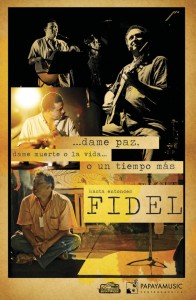Bittersweet Malpais Album
By Jim Parisi
For the many fans, of Malpais it is impossible not to become nostalgic while listening to their new CD. Fans, friends, family and band members were stunned at the sudden and unexpected passing late last August of Fidel Gamboa, the singer/songwriter/guitarist/flautist of this very popular Costa Rican group. After the shock resided a bit, the remaining musicians in the band decided to pay tribute to their fallen leader, which they did, with the help of many other notable musicians, at the National Stadium inSan Josein mid-November to an emotional sold-out audience. During that nether time, the band also discussed releasing one more album, another way to honor their friend and to thank their loyal fans. The decision was an easy one.
The new album, titled “Volver a Casa”, is a mosaic of musical pieces that span the history of the band and Fidel’s careers. The second song on the album, “El Puente”, for example, was written in 2002 with the idea of using it for the band’s first album, Uno but was shelved at the last minute, a gem that was tucked away has now reemerged nearly a decade later. One of Fidel’s side projects had been contributing music for soundtracks and some of the songs on “Volver a Casa” are scores of his that appeared in various films. The opening song, “El Retorno” was written for the Luciano Capelli conservation-conscious documentary “Se quema el cielo”; the instrumental score “Marasmo” was written and recorded for the film of the same name and “Pronostico del tiempo” was co-written with his brother Jaime, the cofounder of Malpais, in 1998, prior to the formation of the band, for the movie of the same name. Fidel was also known for his whimsical, playful side, displayed on this disc with songs like “Falsa Balada para Ana Maria Lara”. The band discovered songs written and recorded in the studio by Fidel that none of them had been aware of. Their task was to put their personal accompaniment and arrangements to these songs prior to releasing them to the public. Another surprising gem they discovered was “A contraluz”, composed at the piano, a musical instrument Fidel did not usually employ.
The album was coproduced by Jaime Gamboa and Luciano Capelli in what could only have been a very emotional labor of love. The presentation of the song list, the liner notes and art design for the album collectively do a wonderful job of juxtaposing this band’s storied history.
Fidel was a poet, a clever storyteller, with subtle messages woven into his tales. He was a visual writer, using physical objects in his lyrics and making it easy for the listener to imagine the subjects of his songs. He was also a humanitarian, clearly portrayed with his array of community work and contributions. The last known song Fidel wrote and arranged in the studio is titled “Vuela sobre la ciudad”, a gentle hymn for peace, a touching end to an incredible career that ended much too soon.


